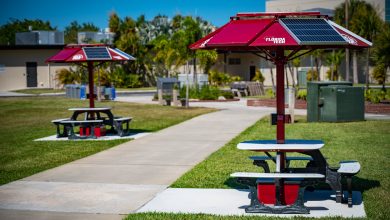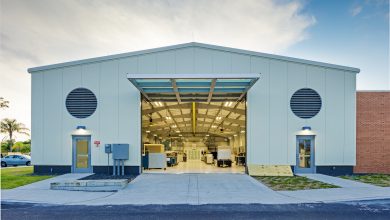Florida Tech Attains LEED Silver Certification for Panther Aquatic Center
Four-Year-Old Facility One of the Only Certified Sustainable Pools in Florida
MELBOURNE, FLA. — The Panther Aquatic Center at Florida Institute of Technology has been awarded a LEED Silver New Construction certification by the Green Building Certification Institute. Leadership in Environmental and Energy Design certification is the standard in national green building design.
Opened in the spring of 2011 and operating year-round, the facility – consisting of a competition swimming and diving pool, a large recreational pool, locker rooms and offices – was transformational for the athletics program with the addition of two new sports and has become one of the Melbourne university’s central amenities.
It was a challenging initiative because swimming pools have high energy and water demands. Student projects played a key role in obtaining needed performance credits, said Ken Lindeman, chair of the sustainability program in Florida Tech’s Department of Education and Interdisciplinary Studies.
“We are proud of the students who helped achieve this,” Lindeman said. “The student-staff project model is novel for university LEED certifications, and our campus should benefit further as we move forward.”
The project’s sustainability initiatives began even before students became involved, with the decision to build a smaller pool and more modest buildings that connect the aquatic center to the buildings on either side of it, Clemente Center and Panther Dining Hall.
Also, the building’s heating and cooling systems are connected to a central chilled-water plant with two 500-ton turbo-core high-efficiency chillers that supply cooling water at greatly improved energy and cost efficiency, said Rob Ghiotto, director of facilities maintenance at Florida Tech.
The student teams worked over several years with both Florida Tech Facilities Operations and outside contractors to help earn the certification. Student projects from an applied sustainability course were integral to the project from start to finish, including the final processing of diverse credits, including siting, energy use, and air quality.
Many students worked directly or indirectly on this project with prominent early efforts by Jake Zehnder, Brian Gillenwater and Lucy Muns, and later efforts led by Tara Ingram and Alexandria Boddy, to achieve final building system certification.
The end result is an aquatic center that offers all of the amenities of a traditional facility but with many cutting-edge facets behind the scenes.
The pool water, for example, is tempered with a geothermal energy system. This state-of-the-art system is one of the most cost-effective method of pool temperature control available. Utilizing a constant, 72-degree underground water temperature as the heating/cooling medium, two wells were drilled, one for up-take water and one for discharge water. The only energy cost for this system is electricity used by the compressor and the pumps. Occupancy sensors set the systems to unoccupied mode when the facility is not occupied.
Greg Tsark, vice president for facilities operations, said sustainable development has long been a part of the development and expansion of Florida Tech’s campus – and it begins with the people.
“We’re really fortunate to be able to design and construct to a high standard on so many projects, and it takes a dedicated team of talented students and folks like Rob and Ken to make it happen,” he said.
For more information on sustainability news and resources at Florida Tech, see www.fit.edu/sustainability.
###





